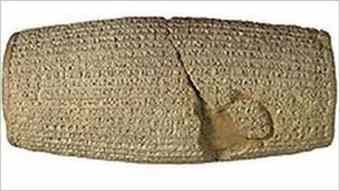The British Museum has settled a dispute with Iran's national museum over the loan of ancient Persian treasure the Cyrus Cylinder.
 In February, the museum in Tehran said it would cut all ties with its British counterpart in protest at a decision to delay an agreed loan of the artefact.
In February, the museum in Tehran said it would cut all ties with its British counterpart in protest at a decision to delay an agreed loan of the artefact.
But officials in Tehran now say the 2,500-year-old cylinder has arrived "under special security".
The piece, discovered in Iraq in 1879, will be displayed for four months.
Persian king Cyrus ordered the cylinder to be made following the conquest of Babylon.
Historians regard it as the world's first declaration of human rights and it is valued by people around the world as a symbol of tolerance and respect for different peoples and faiths.
Neil MacGregor, director of the British Museum, said: "You could almost say that the Cyrus Cylinder is a history of the Middle East in one object.
"It is a link to a past which we all share and to a key moment in history that has shaped the world around us."
The artefact was last displayed in Iran 40 years ago.
In September, the British Museum said it would have to delay handing over of the cylinder due to unspecified "practicalities".
Iran's cultural heritage spokesman Hamid Baghai told Reuters news agency at the time that the organisation had cut all its relations with the British Museum and would no longer co-operate with British officials.
Baroness Helen Kennedy QC, a human rights lawyer and trustee of the British Museum, said: "It is absolutely right that the British Museum fulfils its promise to loan it to the museum in Tehran.
"Art and culture can sustain relationships between the people of nations even when diplomacy is strained."
Source: BBC News [September 10, 2010]